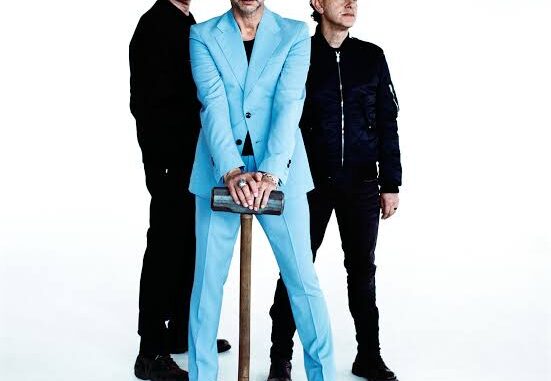
Depeche Mode’s rise from a local English synth-pop outfit to one of the most influential and enduring bands in modern music is a story of relentless evolution, sonic innovation, and raw emotional honesty. Emerging from Basildon, Essex in the early 1980s, the band—originally formed by Vince Clarke, Martin Gore, Andrew Fletcher, and Dave Gahan—quickly carved out a sound that was radically different from anything else on the airwaves. Their blend of electronic minimalism with melodic pop sensibilities instantly caught attention, placing them at the forefront of the burgeoning new wave movement.
Their debut album, Speak & Spell, introduced the world to their playful and accessible sound, with hits like “Just Can’t Get Enough” becoming dancefloor anthems. However, following Vince Clarke’s departure after the album’s release, many wondered if the band could sustain its momentum. Martin Gore stepped in as principal songwriter, and what followed was a significant transformation in tone and style. The music grew darker, more introspective, and philosophically rich—marking the beginning of their ascent into true artistry.
As the 1980s progressed, Depeche Mode expanded the boundaries of electronic music. Albums like Construction Time Again and Some Great Reward showcased their growing interest in industrial textures, sampling, and socially conscious themes. With songs addressing politics, religion, and the human condition, they proved that synthesizers could carry as much emotional weight as guitars or orchestras. Their lyrics resonated deeply with a generation grappling with Cold War anxiety, urban isolation, and a hunger for meaning.
It was the release of Black Celebration and Music for the Masses that cemented their status as international heavyweights. These albums were both sonically adventurous and emotionally immersive, bringing a cinematic quality to their music that few of their peers could match. “Strangelove,” “Never Let Me Down Again,” and “Behind the Wheel” became not only iconic songs but also emotional lifelines for fans around the world. Their soundscapes were not just music—they were atmospheres, moods, and existential statements.
Their 1990 masterpiece Violator is widely regarded as one of the greatest albums in popular music history. Featuring tracks like “Enjoy the Silence,” “Personal Jesus,” and “Policy of Truth,” the album struck a perfect balance between darkness and accessibility. It was a commercial and critical triumph, propelling Depeche Mode into the mainstream without compromising their integrity. The accompanying tour solidified their status as stadium-level performers, capable of evoking rapture from crowds across continents.
The 1993 follow-up, Songs of Faith and Devotion, saw the band experimenting with rock influences and gospel elements, while maintaining their electronic roots. It was a daring reinvention at a time when grunge and alternative rock dominated the charts. The album debuted at No. 1 in both the US and UK, a testament to the loyalty of their fan base and the universal appeal of their themes—faith, pain, addiction, and redemption. However, the era also marked personal turmoil, most notably lead singer Dave Gahan’s struggle with addiction, which threatened the band’s future.
Despite these challenges, Depeche Mode emerged resilient. The late ’90s and early 2000s saw the band navigating changing musical landscapes with grace, releasing albums like Ultra, Exciter, and Playing the Angel, which each introduced new generations to their sound. Their commitment to authenticity and willingness to explore uncomfortable emotional territory kept them relevant in an era increasingly driven by superficiality.
Their influence spans genres and generations. From Nine Inch Nails and The Killers to Lady Gaga and Kanye West, artists across the musical spectrum cite Depeche Mode as a pivotal influence. Their bold integration of electronic elements into mainstream music laid the groundwork for countless acts, while their thematic complexity helped elevate the pop format into a medium for genuine emotional and philosophical inquiry.
Live, Depeche Mode remains a force of nature. Their concerts are less performances and more communal experiences, where thousands of fans find catharsis in the haunting melodies and hypnotic beats. Dave Gahan’s commanding stage presence, Martin Gore’s songwriting brilliance, and the legacy of Andy Fletcher’s grounding influence create an energy that transcends time and genre.
Even after more than four decades, Depeche Mode continues to create with relevance and urgency. Their 2023 release Memento Mori—the first without founding member Andy Fletcher—was both a tribute and a reaffirmation. It echoed with grief, hope, and resilience, proof that their music still speaks profoundly to the human condition. It was a fitting chapter in their ever-evolving journey.
What makes Depeche Mode legendary is not just their catalogue of hits, but their refusal to remain static. They have never rested on past glories, instead choosing to challenge themselves and their listeners with every release. In doing so, they’ve built a legacy that is not merely nostalgic, but deeply vital.
Their story is one of transformation, vulnerability, and enduring power. Depeche Mode didn’t just ride the wave of a musical era—they helped shape it. And as they continue to perform, create, and inspire, they remain more than icons. They are living proof that great music transcends time, culture, and even personal struggle.

Leave a Reply